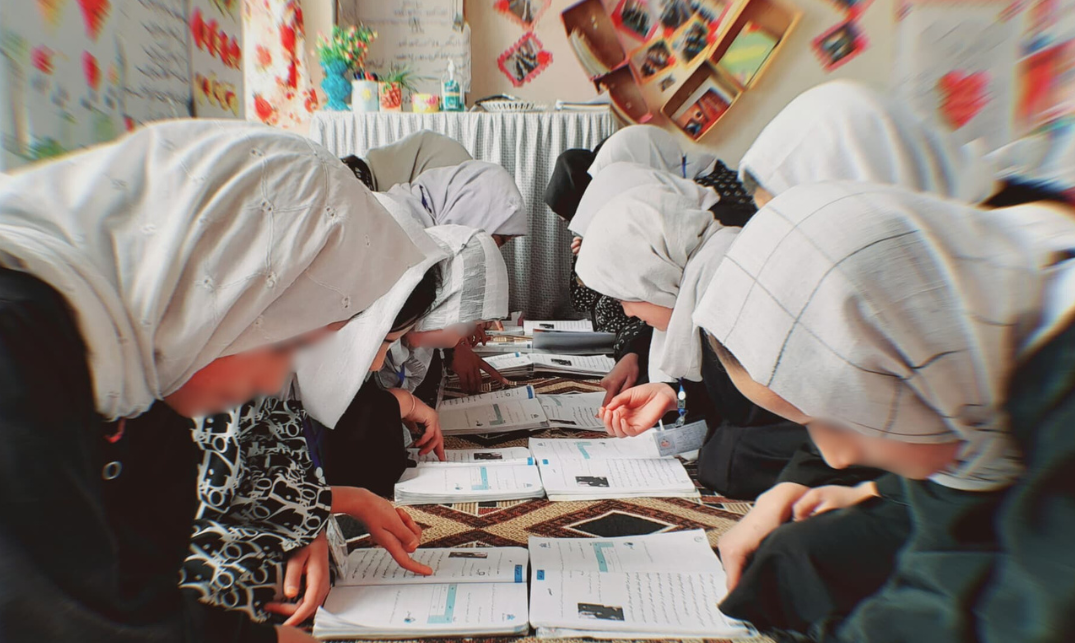
Malala Fund announces more than $1.5 million in new funding for organisations working to keep girls learning in Afghanistan.
More than 1,000 days have passed since the Taliban banned girls’ secondary education in Afghanistan. Millions of Afghan women and girls are now living under a system of gender apartheid — unable to go to school, work or participate in public life. Despite their dire circumstances, women and girls are resisting by learning in secret and speaking out against the Taliban’s oppression.
To honour 1,000 days of women and girls’ resistance, Malala Fund is announcing more than $1.5 million in new funding to 13 organisations working to keep girls learning and hold the Taliban accountable for their crimes. These grants, part of Malala Fund’s Afghanistan Initiative, support the delivery of digital and alternative learning programmes for girls in Afghanistan and advocacy efforts to get gender apartheid recognised in international law.
"We are proud to support these innovative and impactful initiatives,” says Sahar Halaimzai, Director of Malala Fund’s Afghanistan Initiative. “By providing digital and alternative education pathways, we are ensuring that Afghan girls continue their education despite the extreme interruption they have faced over the last three years.”
The new group of grantees are reaching up to 1 million young people with learning content delivered through satellite television and educating thousands of Afghan girls in classes held in homes and learning centres and through online learning.
Learn more about the brave organisations Malala Fund is investing in below.
DIGITAL AND ALTERNATIVE EDUCATION GRANTS
BBC World Service
BBC World Service created the radio, TV and online programme Dars in Pashto and Dari to provide educational content and broadcast inspirational stories and global news to children who are not at school, including girls aged 11-16 barred from formal education. With their grant, they are expanding the programme to more platforms, including digital channels, to reach more children.
Begum Organisation for Women (BOW)
BOW’s radio network, Radio Begum, broadcasts content about women’s rights and empowerment across Afghanistan, and 7-12th grade content daily in Dari and Pashto for students who are learning from home. With their grant, BOW are launching a satellite television channel and app to bring their curriculum to an even larger number of girls. They estimate up to 1 million young people will be able to access educational content through the channel.
LEARN Afghanistan
LEARN are using their grant to continue their hybrid learning approach, giving close to 400 girls aged 13-18 access to quality education. In the communities where LEARN work, girls can access offline and online education focused on the general curriculum through learning spaces. LEARN will ensure their curriculum can be accredited, allowing girls to have a former qualification after completing their secondary education.
Rahela Trust
Rahela Trust provides educational opportunities, scholarships and mentorship for disadvantaged young Afghan women from rural areas. With their grant, Rahela Trust are supporting 50 young women to complete their final two years of secondary education and transition to university. They are providing mentoring and resources, including books and technology, that cover the previous Afghan government’s curriculum in all subject areas.
Street Child
With their grant, Street Child are teaching the grade 7 national curriculum to 770 girls. They are establishing digital classes managed by a team of trained female teachers who will ensure each child is safe, connected and learning. An app will give students, including those with visual or hearing impairments, access to educational resources without needing internet connection.
Too Young to Wed (TYTW)
TYTW works to reduce child marriage around the world through advocacy, programmes and education. With their grant, TYTW are building on existing community networks to organise small group classes in female secondary school teachers’ homes for 540 girls across the country. TYTW are also delivering a home learning programme for 310 girls through a local network of female volunteer teachers.
Women and Children Legal Research Foundation (WCLRF)
WCLRF has a long history of supporting Afghan women through campaign building, advocacy and research. With their grant, WCLRF are supporting 270 girls to access online education and psychological and social support. They are facilitating group sessions led by a psychologist to help girls manage stress and address depression and anxiety.
GENDER APARTHEID ADVOCACY GRANTS
Atlantic Council Strategic Litigation Project
The Atlantic Council recently partnered with Malala Fund to host a high-level panel discussion on gender apartheid in Afghanistan. With their grant, the Strategic Litigation Project are engaging Afghan women’s rights defenders and legal experts worldwide to build support for recognising gender apartheid in international law. They are also targeting important support groups including key U.N. Member States, political leaders and regional coalitions.
Canadian Women for Women in Afghanistan (CW4WAfghan)
For over 20 years, CW4WAfghan has advocated for the empowerment of Afghan women. With their grant, CW4WAfghan are amplifying Afghan women and girls’ educational needs in regional and global advocacy spaces, including the U.N. Human Rights Council. They are also organising workshops and developing materials to encourage other countries to call for the codification of gender apartheid in international law.
Civic Engagement Project (CEP)
CEP advocates for civic freedoms and human rights in Afghanistan. With their grant, CEP are continuing to build a coalition with Afghan women activists in the diaspora to increase their understanding of the legal aspects of codifying gender apartheid. They will also hold a workshop with Afghan women activists and thought leaders to develop policy ideas and advocacy strategies.
Safety and Risk Mitigation Organisation (SRMO)
SMRO trains human rights organisations on how to best conduct their work in Afghanistan. With their grant, SMRO are building a coalition inside Afghanistan among civil society organisations, media agencies and activists to advocate against gender apartheid. They are also amplifying Afghan voices through international radio and print media outlets, allowing them to share their experiences under the Taliban with important global leaders and stakeholders.
